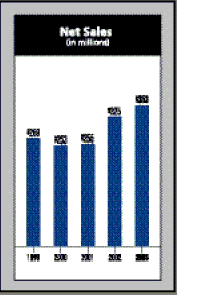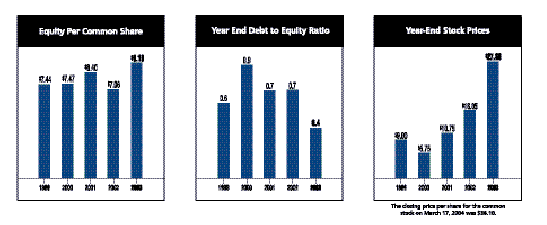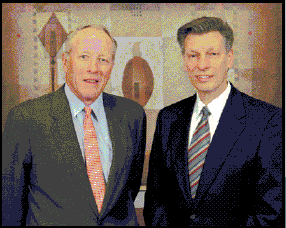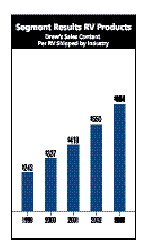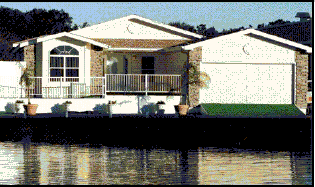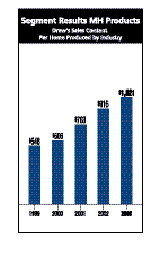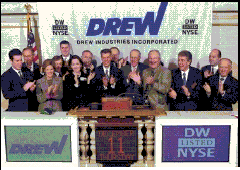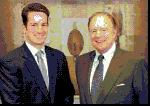A substantial portion of the impairment charge related to the 1997 acquisition of LCI. At the time of that acquisition, LCI was primarily involved in the MH segment, and was just beginning its RV products business. Since that time the MH industry has declined substantially causing a reduction in LCI’s MH sales and profits. During the same period, LCI’s RV business has grown very substantially in both sales and profits. As of November 30, 2002, the Company reevaluated the fair value of the remaining goodwill, which had a book value of $7.0 million, and determined that no additional impairment had occurred. Interest Expense, Net Interest expense, net decreased $0.5 million to $3.0 million in 2003, as a result of reductions in debt levels, and to a lesser extent, savings resulting from interest rate reductions. The interest expense for 2003 also includes $228,000 related to imputed interest on the liability recorded for minimum royalty payments for fiscal years 2003 through 2006. Interest expense, net decreased $0.6 million to $3.6 million in 2002, as a result of reductions in debt levels. Provision for Income Taxes The effective tax rate for 2003 was approximately 38.0%, compared to 38.5% in 2002 and 39.3% in 2001. The decline in the effective tax rate is due to a change in the composition of pretax income for state tax purposes. Discontinued Operations The axle and tire refurbishing business of LTA did not perform well from 2000 through 2002, primarily due to increased competition and the decline in the manufactured housing industry, which severely affected operating margins. In January 2001, the axle and tire refurbishing business closed two of its five factories and in July 2001, a third such operation was sold. In September 2002, the Company converted one of its two remaining axle and tire refurbishing facilities to an RV window production facility. The last axle and tire refurbishing operation was sold in January 2003 at a small gain. As a result, the axle and tire refurbishing business of LTA is classified as discontinued operations in the Consolidated Financial Statements pursuant to Statement of Financial Accounting Standards (“SFAS”) No. 144, “Accounting for the Impairment or Disposal of Long-Lived Assets” adopted by the Company effective January 1, 2002. LTA continues to own a factory in Texas which was previously utilized in its axle and tire refurbishing business. This factory is being leased to the purchaser of LTA’s Texas operation. Since it is not probable that this factory will be sold within one year, it is not considered as held for sale under SFAS No.144, and is not included in discontinued operations in the Consolidated Financial Statements. The proceeds from the disposition of all other significant assets of LTA’s axle and tire refurbishing business, consisting primarily of inventory and accounts receivable, were collected in January 2003 and resulted in a small gain. The discontinued axle and tire refurbishing business had previously been included in the Company’s MH segment, and had revenues of $11.2 million and $14.7 million, in 2002 and 2001, respectively. Recently Adopted and New Accounting Standards As of April 1, 2002, the Company adopted the fair value method of accounting for stock options contained in SFAS No. 123,“Accounting for Stock-Based Compensation,” which is considered the preferable method of accounting for stock-based employee compensation. During the transition period, the Company will be utilizing the prospective method under SFAS No. 148 “Accounting for Stock-Based Compensation — Transition and Disclosures.” All employee stock options granted after January 1, 2002 have been expensed over the stock option vesting period based on fair value, determined using the Black-Scholes option-pricing method, at the date the options were granted. This resulted in a $197,000 and $10,000 charge to operations for the years ended December 31, 2003 and 2002, respectively, relating to options for 396,500 and 20,000 shares granted in the fourth quarter of 2003 and 2002, respectively. Historically, the Company had applied the “disclosure only” option of SFAS No. 123. Accordingly, no compensation cost has been recognized for stock options granted prior to January 1, 2002. Had the Company previously adopted this new accounting policy, diluted earnings per share would have been reduced by $.02 for 2003, $.04 for 2002 and $.04 for 2001. In August 2001, the FASB issued SFAS No.143, “Accounting for Asset Retirement Obligations.” SFAS No.143 requires companies to record a liability for asset retirement obligations associated with the retirement of long-lived assets. Such liabilities should be recorded at fair value in the period in which a legal obligation is created, which typically would be upon acquisition or completion of construction. The provisions of SFAS No. 143 are effective for fiscal years beginning after June 15, 2002. Accordingly, the Company adopted the provisions of SFAS No. 143 effective January 1, 2003. The implementation of SFAS No. 143 did not have a material impact on the earnings or the financial position of the Company. In November 2002, the FASB issued Interpretation No. 45, “Guarantor’s Accounting and Disclosure Requirements for Guarantees, Including Indirect Guarantees of Indebtedness of Others” (“FIN 45”). FIN 45 requires the guarantor to recognize a liability for the non-contingent component of a guarantee; that is, the obligation to stand ready to perform in the event that specified triggering events or conditions occur. The initial measurement of this liability is the fair value of the guarantee at its inception. The recognition of the liability is required even if it is not probable that payments will be required under the guarantee or if the guarantee was issued with a premium payment or as part of a transaction with multiple elements. FIN 45 also requires additional disclosures related to guarantees. The recognition measurement provisions of FIN 45 are effective for all guarantees entered into or modified after December 31, 2002. FIN 45 also requires additional disclosures related to guarantees in interim and annual financial statements. Accordingly, the Company adopted the provisions of FIN 45, effective January 1, 2003. The implementation of FIN 45 did not have an impact on the earnings or the financial position of the Company.
DREW INDUSTRIES INCORPORATED 2003 ANNUAL REPORT 13
|

 DREW INDUSTRIES INCORPORATED
DREW INDUSTRIES INCORPORATED